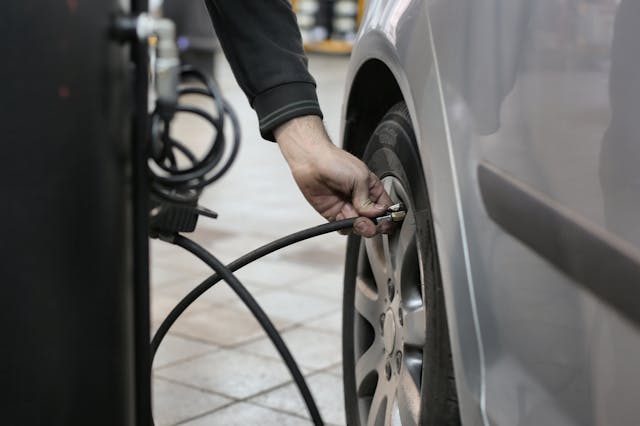- Regularly check tire pressure to improve fuel efficiency, handling, and traction on the road.
- Maintain vehicle cleanliness to prevent rust and opt for professional detailing for a comprehensive cleaning.
- Change your oil and check fluid levels regularly to prevent engine damage and improve fuel efficiency.
- Follow the manufacturer’s maintenance schedule to catch issues early and replace filters, belts, hoses, and check brakes.
As a car owner, keeping your vehicle in top condition is essential for both safety and longevity. While regular maintenance at the mechanic is vital, there are also quick and convenient ways you can take care of your car on your own. This blog will discuss easy tips to help you keep your car running smoothly without taking up too much of your time.
Check Your Tire Pressure Regularly

One of the simplest ways to maintain your car is by regularly checking the tire pressure. Properly inflated tires not only improve fuel efficiency but also ensure better handling and traction on the road. You can quickly check your tire pressure using a gauge available at any auto parts store or gas station. Be sure to refer to your owner’s manual for the recommended pressure levels for your specific vehicle.
Keep Your Car Clean

A clean car not only looks better but also helps prevent rust and corrosion. Regularly washing and waxing your car can help protect its exterior from environmental damage, such as dirt, bird droppings, and road salt. Don’t forget to clean the interior as well, vacuum carpets, wipe down surfaces, and clean windows to maintain a fresh and pleasant driving environment.
If you want to take it up a notch, you can employ the help of a professional mobile detailing service provider. They will have the necessary equipment and expertise to give your car a deep clean, leaving it looking like new. They can also help make car maintenance more convenient as you won’t have to drop off and pick up your car from a traditional detailing shop. They’ll come to you!
Change Your Oil Regularly
Oil is the lifeblood of your engine, so it’s crucial to change it regularly to keep everything running smoothly. Check your owner’s manual for the recommended oil change intervals for your specific make and model. Changing your oil at home is relatively simple with the right tools and materials, or you can take it to a quick lube service for convenience.
Additionally, make sure to use the recommended type and grade of oil for your vehicle. Using the wrong kind can lead to engine damage and void your warranty. Regular oil changes not only help prolong the life of your engine but also improve fuel efficiency.
Check Fluid Levels
In addition to oil, it’s essential to regularly check other fluid levels in your car, such as brake fluid, coolant, power steering fluid, and windshield fluid. Low fluids can cause severe damage to your vehicle if left unchecked. Most fluids have reservoirs that are easy to access under the hood, making it simple to top them off as needed.
Keep Up with Routine Maintenance
Following the manufacturer’s recommended maintenance schedule is vital to keeping your car in peak condition. Keeping up with routine maintenance can help catch potential issues early on before they turn into costly repairs down the line. This includes tasks such as the following:
Replacing Filters
Replacing air, oil, and fuel filters is an essential part of routine maintenance. These filters help keep your engine running smoothly by trapping dirt and debris that could otherwise cause damage.
Inspecting Belts and Hoses
Inspecting belts and hoses for wear and tear is essential to prevent them from breaking or leaking, which can lead to costly repairs. Look for cracks, fraying, or bulging in your belts and hoses and replace them as needed.
Rotating Tires
Rotating your tires helps ensure even wear and extends their lifespan. This should be done every 5,000-8,000 miles for most vehicles. It’s also a good idea to have your tires balanced and aligned during regular maintenance.
Checking Brakes
Checking your brakes regularly is crucial for both safety and preventing costly repairs. If you notice any issues, such as squeaking or grinding noises, vibrations, or difficulty stopping, it’s essential to have them inspected and repaired immediately.
By keeping up with routine maintenance, you can prevent minor issues from turning into more significant and more expensive problems. It’s also a good idea to keep track of your maintenance records so you can easily stay on top of when specific tasks need to be done.
Maintaining your car doesn’t have to be a time-consuming or complicated task. By regularly checking tire pressure, keeping your vehicle clean, changing oil, monitoring fluid levels, and adhering to routine maintenance schedules, you can significantly extend the lifespan and enhance your vehicle’s performance. These straightforward steps save you time and prevent future costly repairs, ensuring a safe and smooth driving experience. So, take a little time to care for your car, which will take care of you on the road.

